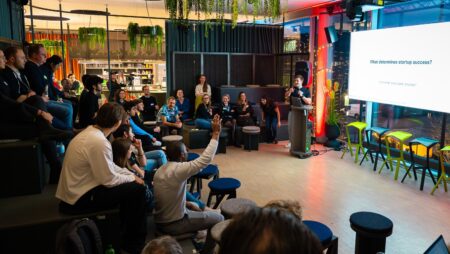
The Science of Startups Initiative
This project aims to reveal the determinants of success in entrepreneurship, startups and innovation ecosystems using data science and qualitative research methods.
The internet plays an important part in our daily lives, and our research addresses the psychological, social and educational implications of the internet across the full lifespan, with a particular focus on children and young people.
We employ theoretically diverse approaches and an array of methods (including experiments, interviews and national surveys) to investigate the benefits and risks associated with the internet in everyday life.
With technology now such an integral part of our daily lives and increasingly so for adolescents, it’s crucial we understand what’s driving these shifts in wellbeing and whether technology is a consistent underlying factor across all nations.
Professor Andrew Przybylski
Professor of Human Behaviour and Technology

It is often claimed that the overall mental well-being of young people is undergoing a pronounced period of decline and some have implied that digital technologies might be driving this trend. This program of research aims to address both of these assumptions directly with empirical data drawn from more than two dozen countries over the past 30 years.
Of central interest are three research questions:
To answer these questions we need to draw translate and harmonise many datasets, integrate data on technology and mental health on an annualised basis for each country, and perform both time series and structural equation modelling to test overall, comparative, and technology-related trends.

This project aims to reveal the determinants of success in entrepreneurship, startups and innovation ecosystems using data science and qualitative research methods.

This project will develop useful and responsible machine learning methods to achieve real-world early detection and personalised disease outcome prediction of inflammatory arthritis.

AI technologies are increasingly being promoted to automate or augment work in the education sector. With the growth of these technologies, this project asks what tasks and skills are being affected by the adoption of AI in the education sector.

19 February 2024
We are delighted to announce the winners of the 2023 OII MSc Thesis Prizes.

22 January 2024
Departmental Research Lecturer Dr Fabian Braesemann visited Germany to present his latest research on the power of personality in shaping the success of startups and beyond.

8 December 2023
Instead of fixating on isolated risks and regulatory gaps, it is crucial to focus on how developers are making decisions about safety and performance issues in medical AI.

BBC World Service, 30 March 2024
Prof Przybylski speaks to the BBC World Service 'Newshour' programme about adolescents, social media and wellbeing in light of recent calls to ban children from using smart phones.

Vox, 19 March 2024
What banning phones in schools can — and can’t — do.

Phys.org, 11 March 2024
A research team from Oxford and Glasgow has found that prepayment cards provided to U.K. asylum seekers by the Home Office are collecting their data and controlling their behaviors in ways that have highly detrimental impacts on their well-being.

Professor of Education, the Internet and Society
Rebecca Eynon's research focuses on learning and the Internet, and the links between digital and social exclusion.
Rebecca Eynon is Professor of Education, the Internet and Society, with her post held jointly by the OII and Oxford’s Department of Education.
Her research explores the relationships between education, the Internet and inequalities, and has been published in top journals including Information, Communication & Society, Learning, Media and Technology, and British Journal of Educational Technology. She has also published two books on education and technology with Routledge. She was co-editor of Learning, Media and Technology from 2011-2021. She is currently on the editorial board for Learning, Media and Technology and Information and Learning Sciences.
Her work has been supported by a range of funders including the British Academy, the Economic and Social Research Council, the European Commission and Google. Projects she has worked on have investigated the ways in which creative human/AI collaboration might contribute to human flourishing, asked about the causes of lapsed internet use among young people, and developed new survey measures of peoples’ digital skills.
Rebecca teaches on the MSc Social Science of the Internet at the OII and on the MSc Education (Digital and Social Change) at the Department of Education. At both departments, she supervises DPhil students interested in digital education and social justice.

Director, Associate Professor, Senior Policy Fellow
Victoria Nash is the OII's Director and a Senior Policy Fellow. Her research focuses on the opportunities and risks experienced by children using digital technologies; she also leads OII engagement on Internet regulation and digital policy issues.

Professor of Human Behaviour and Technology
Professor Przybylski is a psychologist who studies how online social media and video games platforms influence users’ mental health. His research focuses on how data from these platforms can inform regulation, policymaking, and expert advice.

Associate Professor, Senior Research Fellow
Bernie Hogan examines how to capture, represent and think about social networks, especially personal social networks. His work focuses on the role of design in social media, network capture techniques and theories of relationships.